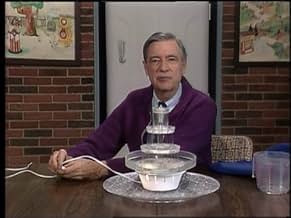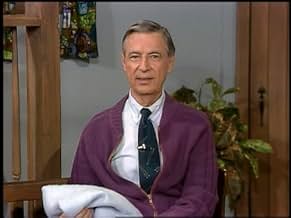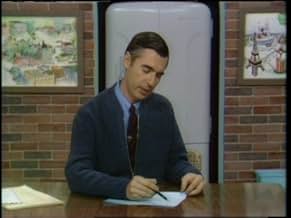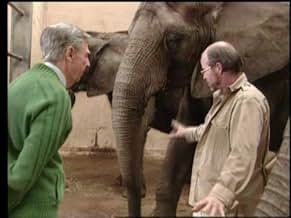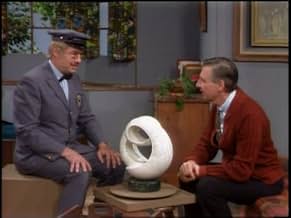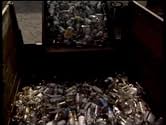NOTE IMDb
8,8/10
10 k
MA NOTE
Fred Rogers explore divers sujets pour les jeunes téléspectateurs à travers des présentations et de la musique, aussi bien inspiré de son univers que de son imagination.Fred Rogers explore divers sujets pour les jeunes téléspectateurs à travers des présentations et de la musique, aussi bien inspiré de son univers que de son imagination.Fred Rogers explore divers sujets pour les jeunes téléspectateurs à travers des présentations et de la musique, aussi bien inspiré de son univers que de son imagination.
- Nommé pour 3 Primetime Emmys
- 8 victoires et 66 nominations au total
Parcourir les épisodes
Avis à la une
Fred McFeely Rogers. A brilliant man. In a time when children were largely ignored (and even feared at times by adults) this man had the good sense to realize one simple fact: children are people too! I am 20 years old and I am PROUD to claim that I watched Mr. Rogers every day growing up. All I watched when I was little was Mr. Rogers, Sesame Street, and Today's Special. Those were children's shows that made a child feel good. Unlike the wave of horrible children's shows that came in a few years ago (any show ending with -mon comes to mind), these shows were real. Mr. Rogers was real. You could almost believe that he really was your neighbor. He seemed like the kind of man you would see every day. But there was a huge difference: he loved and cared about children. Mr. Rogers has taken a lot of flack for his feelings towards children. How sad is it that feelings such as kindness, love, and sympathy are regarded with suspicion? Despite hundreds of attacks, despite cries of "pedophile" or "child raper", this man never wavered in his beliefs. He never backed down from what he felt was right. Some people (including 1 person on here) have wondered about the origin of the name McFeely. Well, I will tell you. It's not a hidden reference to a supposed desire to "feel" children. McFeely is his middle name, his mother's maiden name, and his maternal grandfather's name. His grandfather was responsible for some of Mr. Rogers' trademark lines: "I like you just the way you are", among others. Some people may know the song "Mr. Rogers" by Korn. Jonathan Winters, the lead singer and songwriter, screams at him "I hate you!" "I wish I never would have watched you" and "child f----r" to name a few. The reason Winters had so much hostility towards him is that as a child when he heard Mr. Rogers' kind words, he thought it meant that if you were nice to people, they would be nice to you. He thought everyone in the world was like Mr. Rogers. Unfortunately, he was wrong, and Winters was molested on many different occasions by a neighbor. Very sad, yes, but he was only projecting his anger onto this kind man. I think even Winters realizes that he really doesn't blame Fred Rogers for what happened to him. In conclusion, I'd just like to say thank you to Fred Rogers for giving so much of yourself to us and asking so very little in return. God bless you, Mr. Rogers, and my prayers go out to his family and friends.
Never underestimate the power of Public Television. Fred Rogers makes children feel comfortable and loved, even if their home life isn't perfect. They don't really show the oldest episodes on PBS, but even back in 1968, Mr. Rogers was having episodes about difficult topics, one episode from the aforementioned year about the assassination of Bobby Kennedy. One might jeer at Mr. Rogers' style of taking his fancy jacket off and changing into a sweater, or changing from his business shoes into tennis shoes, but it gives the feeling comfort in a weary world.
10kerose
At age 52, I have fond memories of watching Mr. Rogers' Neighborhood when public television was in its infancy. Fred Rogers not only talked about feelings, but he also addressed young people in a way that respected us as intelligent people in our own right. Sure, he had the Neighborhood of Make Believe, and the entity he referred to as his "television house." The best part is that on one episode he addressed us and said, "Here's why you won't see me in the neighborhood of make believe" and went on to describe how he works with the puppets behind the scenes. In another episode, he shows the studio and how they put the show together.
One memorable episode dealt with Mr. Rogers getting a traffic ticket and going before the judge - he's human, too.
Mr. Rogers always made it clear that it is good to play and to pretend. I strive to be the kind person that Mr. Rogers was - I want to have that same calm demeanor.
Long live Fred Rogers in our hearts. I wish I could have met the man.
One memorable episode dealt with Mr. Rogers getting a traffic ticket and going before the judge - he's human, too.
Mr. Rogers always made it clear that it is good to play and to pretend. I strive to be the kind person that Mr. Rogers was - I want to have that same calm demeanor.
Long live Fred Rogers in our hearts. I wish I could have met the man.
The Mr. Rogers you saw pay a television visit to your house was the same Mr. Rogers in real life should you ever have run into him. On the night of writing this we lost Fred Rogers who passed away at the age of 74 years of age. His show took the basics of 1950's TV production and stayed with it even since. It was all about having a conversation with his TV friend. In broadcasting you may speak to many people, but speak as only one person was talking to you.
His first show was the Children's Corner (1953-61) which featured a woman by the name of Josie Carry. Although he got hosting credit, he never appeared in front of the camera, but rather was the puppeteer. The Children's Corner developed most of his puppet characters including Daniel Stripped Tiger, Henrietta Pussycat, X the Owl, and King Friday XIII. The Children's Corner was done live at Non-Commercial TV station WQED in Pittsburgh. It was a fun show if anything, and Josie and the puppets talk about Mr. Rogers a lot.
After Children's Corner he moved to Canada and did a show simply called Mister Rogers (1962-64), and it was first time he was on camera. The show was 15 minutes but it developed something which we know now as the Neighborhood of Make-believe. This Neighborhood was the majority of this short show, but Fred Rogers would appear at the beginning and ending of the program, and he would show off a few things before he had "make-believe" with the viewers. Usually it was some kind of vehicle that takes us to the Make-believe world.
In 1966 Fred returned to WQED and all that he developed would come together and Mister Rogers Neighborhood signs on the air for the first time. Fred wrote and sang shows for the show, and he showed fun things to the audience. His trips to the Neighborhood of Make Believe incorporated storylines about how people (and puppets) no matter how hard they try they should just try to be themselves and deal with live life issues in the fantasy world. Mr. Rogers also took us around the TV neighborhood on soundstages at first but the post 1979 shows took us to actual places in the real world.
Fred Rogers never liked TV for himself, but he knew how to use it to make an impact on people, and impact he did. He did most of the writhing on the show, nobody would dare tell him what to do, not saying they would. I would have loved to meet him myself, but I will never get that chance. He didn't care about being a celebrity. Just someone who cared about people and try to a "neighbor" to them.
Rest In Peace.
His first show was the Children's Corner (1953-61) which featured a woman by the name of Josie Carry. Although he got hosting credit, he never appeared in front of the camera, but rather was the puppeteer. The Children's Corner developed most of his puppet characters including Daniel Stripped Tiger, Henrietta Pussycat, X the Owl, and King Friday XIII. The Children's Corner was done live at Non-Commercial TV station WQED in Pittsburgh. It was a fun show if anything, and Josie and the puppets talk about Mr. Rogers a lot.
After Children's Corner he moved to Canada and did a show simply called Mister Rogers (1962-64), and it was first time he was on camera. The show was 15 minutes but it developed something which we know now as the Neighborhood of Make-believe. This Neighborhood was the majority of this short show, but Fred Rogers would appear at the beginning and ending of the program, and he would show off a few things before he had "make-believe" with the viewers. Usually it was some kind of vehicle that takes us to the Make-believe world.
In 1966 Fred returned to WQED and all that he developed would come together and Mister Rogers Neighborhood signs on the air for the first time. Fred wrote and sang shows for the show, and he showed fun things to the audience. His trips to the Neighborhood of Make Believe incorporated storylines about how people (and puppets) no matter how hard they try they should just try to be themselves and deal with live life issues in the fantasy world. Mr. Rogers also took us around the TV neighborhood on soundstages at first but the post 1979 shows took us to actual places in the real world.
Fred Rogers never liked TV for himself, but he knew how to use it to make an impact on people, and impact he did. He did most of the writhing on the show, nobody would dare tell him what to do, not saying they would. I would have loved to meet him myself, but I will never get that chance. He didn't care about being a celebrity. Just someone who cared about people and try to a "neighbor" to them.
Rest In Peace.
I highly resent the way many people talk about this show. Many of the things Fred Rogers does may seem ridiculous to us adults, but this is the best show ever to teach little children valuable skills for their futures. Fred Rogers is a wonderful man and really cares about kids. He hosts a show that is very educational for kids all the way up to age 7 or 8 and teaches good manners, what goes on in life, and introduces young children to the world they live in.
Personally, I grew up watching this show. I watched it until the age of seven. I learned a lot from Mr. Rogers and have great respect for the man. His show is very good at teaching little kids important things, and explaining things to them. It is also good for parents to watch with their kids. Many kids these days lack the skills which Mr. Rogers teaches. It is also very entertaining for kids. I highly recommend every little kid to watch this show. Kids and even some adults can learn skills which every body needs. Judging this show from watching it as a kid: On a scale of 1-10, I give this show a 10 in the way of kid shows, and a letter grade of A+! It may seem dull for adults, but it is very educational, and valuable for the future of kids who will one day be grown ups like us.
Personally, I grew up watching this show. I watched it until the age of seven. I learned a lot from Mr. Rogers and have great respect for the man. His show is very good at teaching little kids important things, and explaining things to them. It is also good for parents to watch with their kids. Many kids these days lack the skills which Mr. Rogers teaches. It is also very entertaining for kids. I highly recommend every little kid to watch this show. Kids and even some adults can learn skills which every body needs. Judging this show from watching it as a kid: On a scale of 1-10, I give this show a 10 in the way of kid shows, and a letter grade of A+! It may seem dull for adults, but it is very educational, and valuable for the future of kids who will one day be grown ups like us.
Le saviez-vous
- AnecdotesMr. Rogers always explained to the audience what he was doing when he fed his fish. This was in response to a piece of mail from a blind girl who wanted to know when it happened on each episode.
- GaffesIn the 1979-1981 episodes when Mr. Rogers takes off his sweater and closes the closet door, he'd often close it too fast so it came open a ways, but then the closet door begins to close on its own, as if someone were behind the door pulling it closed.
- Citations
Mr. Rogers: You make each day a special day. You know how, by just your being you. There's only one person in this whole world like you. And people can like you exactly as you are.
- Crédits fousRight before the end credits of "Conflict" #1525, a message appears on screen that says, "And they shall beat their swords into plowshares. And their spears into pruning forks; Nation shall not lift up sword against nation. Neither shall they learn war anymore".
- Versions alternativesVarious theme-week episodes were released to video in the late-1980s in a special format. For instance, the week of "Day Care and Night Care" (#1516-1520) was released to video under the title "When Parents Are Away", and featured the Neighborhood of Make-Believe segments, edited into new segments featuring Mr. Rogers, as well as old segments like him visiting the day care home. In the old version, Fred meets Mr. McFeely at Brockett's bakery and they go to the day care home together. But in the video version, Mr. McFeely visits Mr. Rogers from Brockett's bakery and they leave from the house.
- Bandes originalesWon't You Be My Neighbor?
Performed by Fred Rogers
Meilleurs choix
Connectez-vous pour évaluer et suivre la liste de favoris afin de recevoir des recommandations personnalisées
Détails
- Durée
- 30min
- Couleur
- Rapport de forme
- 1.33 : 1
Contribuer à cette page
Suggérer une modification ou ajouter du contenu manquant








